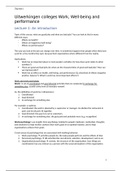[Typ hier]
Uitwerkingen colleges Work, Well-being and
performance
Lecture 1: An introduction
Topic of this course: what are good jobs and what are bad jobs? You can look at that in many
different ways:
- Effects on health?
- Effects on happiness/well-being?
- Effects on performance?
The way you look at the job can change over time. It sometimes happens that people when they have
a job for a few months they quit, because their expectations where different from the reality.
Implications:
Work has an important place in most people’s activities (Q: how does work relate to other
activities?)
There are good and bad jobs (Q: what are the characteristics of good and bad jobs? How can
we improve jobs?)
Work has an effect on health, well-being, and performance (Q: what kind of effects (negative
positive, balance?), What in work has most important effects?)
Work and work psychology
Work= ‘a set of coordinated and goal-directed activities that are conducted in exchange for
something else, usually some form of monetary reward’.
So, the definition of work has 3 dimensions:
1. Coordinated
2. Goal-directed
3. In exchange for something else
For example: a waitress.
1. Coordinated: the work is planned by a supervisor or manager. He divides the restaurant in
parts and let all parts fit together.
2. Goal-directed: the goal is to serve customers.
3. In exchange for something else: she gets paid and probably more (e.g. recognition)
Work psychology= use insights from psychology (related to people’s behavior, motivation, thoughts,
and emotions) to help workers achieve their work-goals in an optimal manner, and to help
organizations achieve their goals.
3 main areas of psychology that are associated with working behavior:
1. Work psychology activities people do, the tasks people perform and the effects of that
2. Personnel psychology HR-activities like recruitment, selection, development, and so on.
3. Organizational psychology context, the structure of the organization, how things are
coordinated, how you interact as a person with the social atmosphere of the organization.
1
,[Typ hier]
Work psychology applied to the waitress:
- Organizational goals: good service performance, high customer satisfaction and high profits.
- When do waitresses show the desired behaviors for good service performance?
Right thoughts/mindset (‘the client is always right’), positive mood/feeling well, give the
feeling you are not under pressure, motivation.
Psychology is about behaviors, thoughts and feelings people have.
Big question: how to design work so that it is motivating, enjoyable (emotions), offers learning
opportunities, and does not induce stress (health)?
Work psychology is important, because:
Because of the amount of time we spend working
Because work has the potential to make us happy
Because work has the potential to make us sick
Because of the increasing expectations of employers
This course deals with the individual worker and his/her work, well-being and performance. It maily
deals with literature in the area of work psychology and occupational health psychology. It is focused
on the individual level, the work psychology of a person.
Historical perspectives: The roots of work psychology
Psychology starts around the 19th century. Around 1850 psychology starts in the agrarian period. Also
the period after the agrarian period, the industrial revolution, psychology played a role. So the
agrarian period and the industrial revolution was the start of psychology.
In the beginning of the 20th century psychology became more and more applied in practical problems
and issues. One of the things psychology was applied to was the selection of people. This we call
psychotechnics.
Psychotechnics= The practical or technological application of psychology, as in analysis of social or
economic problems. (applied to recruitment, selection, personality tests).
This became popular by the development of factories; it was needed for companies to have an easy
way to select people to the right jobs.
Pioneers:
Jean Marie Lahy
- Experiments on the selection of streetcar operators
- General method for employee selection (normed tests)
Munsterberg
- “selection of those personalities which by their mental qualities are especially fit for a
particular kind of economic work”.
- Work on the selection of drivers, typists, army gunners, etc.
Question rises up: How can we led people do their work in the most efficient way?
Taylor with scientific management. He developed certain principles of working where
the output and performance is maximized.
“As to the importance of obtaining the maximum output of each man and each machine, it is only
through the adoption of modern scientific management that this great problem can be finally
solved”. – Taylor.
Trying to put work into smaller pieces and try to think of efficient ways of doing jobs. The focus was
laying on the task (simplification of tasks). The focus of Taylor was efficiency.
2
,[Typ hier]
“…in nineteen out of twenty industrial establishments, the workmen believe it to be directly against
their interests to give their employers the best initiative, and that instead of working hard to do the
largest possible amount of work and the best quality of work for their employer, they deliberately
work as slowly as they dare while they at the same time try to make those over them believe that
they are working fast.” (Taylor, 1939)
“there is a science of handling pig iron, and […] this science amounts to so much that the man who is
suited to handle pig iron cannot possibly understand it, nor even work in accordance with the laws of
this science, without the help of those who are over him” (Taylor, 1911)
So what you see in this quotes are 2 assumptions of Taylor: workers are both lazy and
stupid.
The solution of scientific management:
Simplification of tasks
Examine the best way to conduct the tasks
Training workers in the one best way to conduct the tasks
Separating the planning of tasks from their execution
Selecting workers for particular tasks (right people on the right tasks)
After scientific management, the human relations movement becomes popular.
Hawthrone studies (1924 – 1932) = al lot of experiments on employees in a factory on different
issues (e.g. lighting on productivity, breaks, work times). People in the experiments feel like special
persons, they get attention, and they improve their performance. When you make an employee feel
they are special, that really improves their performance.
“From the time of the publication of the results of the Hawthorne Studies onward, no one interested
in the behavior of employees could consider them as isolated individuals. Rather, such factors and
concepts as group influences, social status, informal communication, roles, norms, and the like were
drawn upon to explain and interpret the voluminous data from these studies and other field
investigations that followed them”
Contemporary work psychology: Well-being & performance
Work psychology today mainly focuses on well-being and performance at work in the way to try to
find a balance. People are expected to deliver, perform well and work hard, but also their well-being
should be taken into account. How can you combine that people feel happy but still are ready to
work hard?
The definitions of well-being and health looks like a circle:
Well-being= the state of being comfortable, healthy, or happy.
Health= a state of complete physical, mental and social well-being and not merely the absence of
disease or infirmity.
(!)3 dimensions of well-being at work:
1. Health (physical well-being)
Work as a source of disease and injuries, stress, and health benefits
2. Relationships (social well-being)
Work as a source of trust, support, reciprocity, exploitation, and power abuse
3. Happiness (psychological well-being)
Work as a source of pleasure and satisfaction (passive) and fulfillment/engagement
(active) or the opposite thereof.
3
, [Typ hier]
Performance can be seen as a process or as a result:
- Process: “The action or process of performing a task or function”
- Result: “A task or operation seen in terms of how successfully it is performed”
An important distinction how you look at performance:
1. Process/action Looking at performance people do, that they are working on constantly.
People at work are not constantly delivering and reaching certain goals, but working on a
process that can achieve goals on the long run. ”performance is what the organization hires
one to do, and do well”
2. Result/outcome “The consequence or the result of the individual worker’s behavior”.
Associated with a shorter period of time.
Dimensions of individual job performance:
Task performance (proficiency)
Organizational citizenship behaviors (OCB; going the extra mile).
Do other things in addition to your own job. E.g. help your colleagues, come up with new
innovative ideas, think about better ways to do your job, you work over time. OCB goes
beyond the things that are expected of you to deliver, just performing your tasks. OCB is
about the additional things.
Counterproductive work behaviors.
E.g. stealing at work, delivering bad quality.
Employee withdrawal behaviors
People do not turn up at work or take longer breaks.
The future of work psychology. What are the challenges for work psychology?
- The content of work is changing. Today service and knowledge work is becoming more and
more important. This also changes the things that are needed for employees in help them to
perform well in their job.
- Increase in diversity of the workforce. More people with different backgrounds come in.
- Much more flexibility. We can be more flexible in to choose the place where you work, when
you want to work, how you want to work and with who you want to work.
- Becoming more global . Connections with other people in other places are easier to make,
because of all kinds of applications.
- Situation in companies is more changing. Organizational change is very common. The
organization want to improve things, because they want to be competitive.
- Psychological contracts.
Psychological contracts: as an employee you have a formal contract with your employer. But you
also have all kinds of ideas what your employer is obligated to provide you with and what you are
obligated to provide your employer. (think about the dimensions of performance: OCB). It’s about
the mutual obligations that you have created with your supervisor AND with your team or
department. When you work together with other people, and you have to work at joined goals, it is
important you can trust each other and that you know someone else can help you out when it is
needed. It is also a team thing. You can have a team psychological contract, but also an individual
employer- employee psychological contract.
A difficulty with the psychological contracts is that in the way they have to change constantly
because the situation in the organization or department is changing (e.g. new people come in your
team). Then you have to adjust your psychological contract.
4





